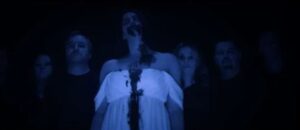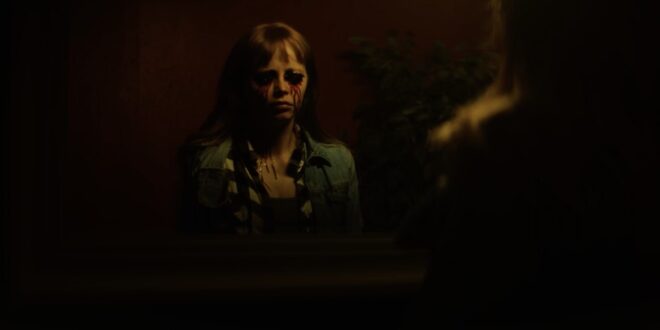Note: This piece was written during the 2023 WGA and SGA-AFTRA strikes. Without the labor of the writers and actors currently on strike, The Woman Under the Stage being covered here wouldn’t exist.
If you’re one of those people who tends to multitask when watching movies at home, be forewarned that in the case of The Woman Under the Stage, you’re going to need to forgo other goings on. You need to pay close attention, right from the opening credits. They kick off with a bang, intercut with scenes of an agitated man hammering away on a typewriter. A voice eloquently narrates what is presumably being committed to paper, until at last, it all stops, and he utters, “the bell invites me.” What bell? Inviting him to what? What does it mean? It’s not the last time you’re going to hear it, and you have a whole movie to figure out what you think it means.
SYNOPSIS:
Whitney Bennett, a young actress struggling with her mental health, played to vulnerable, disillusioned, disoriented perfection by Jessica Dawn Willis (Silhouette 2019), gets involved with a mysterious stage production. She is leery of the show’s legitimacy from the start. It’s a first-time director, working from a script that can’t be revealed until the first rehearsal, and the only copy of which will be burned after a one-night only performance. As if that weren’t sketchy enough, she has to agree to live in the theatre with the entire cast and crew for the two months prior to opening/closing night. As she doesn’t have much to lose, she agrees, kicking off a dark journey of the soul, pushing herself far beyond her existing boundaries to find out exactly how far she’ll go to make her name mean something to the world.
The Woman Under the Stage is a harrowing, and ultimately haunting film. It was made by Absentia Pictures and produced by Mitch McLeod (Silhouette 2019) for a mere $30,000, but it doesn’t look like it. The direction by Ezekiel Decker (Dancing with Myself 2019) is on point, creating a dark, atmospheric tone that evokes a palpable feeling of claustrophobic oppression and dread. The script by Decker and Logan Rinaldi (in his film writing debut) is solid. The effects are extremely effective. The performances are very high caliber. One actress was so good, it took me several minutes to recognize she played a second role. It’s a very clever manipulation of Whitney’s perceptions and ours. I’ll let you figure out which one on your own.
HOW DO WE FEEL ABOUT ART FOR ART’S SAKE?
One of the themes of the film that really struck me is the exploration of whether art must have an audience to have value or whether there is value in creating art strictly for art’s sake. Shortly before they are sequestered in the theatre, the director, played with the perfect balance of smugness, ego, intensity, and charm by Matthew Tompkins (Confession 2022) tries to ascertain Whitney’s feelings about one of his favorite pieces of music, composed despite the musician having no audience to receive it. He asks her with reverence, “can you imagine writing that and never knowing if anybody else would ever hear it?”

Variations on this theme persist throughout the film. Whitney says in a moment of confrontation, “I just want my name to mean something.” Ashley Spicer (Azteq vs the Prowler 2017), as another performer in the stage production has a totally different take. “The world ends when people choose greatness over love.” Is this the choice Whitney is being set up to make? Love or glory?
FALLING DOWN THE RABBIT HOLE
The pressure of her role and the intensity of her interactions with other members of the production take a heavy toll on Whitney’s already tenuous mental health. She learns the knife they are using for her death scene is the real deal. And razor sharp. She spirals further and further downward, losing focus and perspective. She sees disturbing images and hears unexplained noises that terrify her. It becomes challenging for her to separate reality from performance. It’s challenging for the viewer to be certain about what’s real and what’s delusion.

When the producer asks her to imagine what would happen if an actor was “so lost in his performance that the circumstances became more and more authentic,” she thinks of the knife and asks him desperately if she is there to die. She begins to feel certain that she will not get out of this experience alive.
SYMBOLIC GESTURES
There are symbols that repeat throughout the movie: mirrors, a sherry glass, and the phrase “the bell invites me.” The appearance of these symbols signals a shift in her perceptions and experiences. She says she sees her dreams dying every time she looks in a mirror. There are mirrors everywhere. The sherry glass is a variation of the spinning top in Inception, except is it indicating that we are shifting out of an altered state, or into it?

And what exactly does the woman under the stage have to do with this story? She represents a concept more than an actual woman – the ghosts of actors who came before, leaving their spirits behind to haunt the stage from below. They create chaos and confusion, which further taxes Whitney’s fragile grip on reality.
FINAL THOUGHTS ON THE WOMAN UNDER THE STAGE
Ultimately, this film quickly captured my interest and kept it all the way through. I felt anxious and disturbed alongside Whitney as she struggled. As an artist myself, it covered some philosophical ground that left me thinking long after it was over. The horror in this movie was almost entirely generated by an internal struggle of one human being against her own sense of mortality, and the possibility of obscurity – being insignificant, isolated, and unloved. This might be the most relatable horror there is.
 PopHorror Let's Get Scared
PopHorror Let's Get Scared




